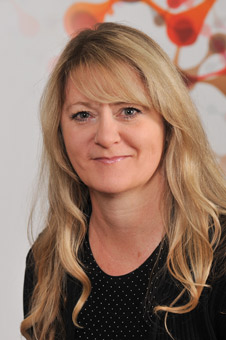
Dr Heather Cunliffe.
Breast cancer accounts for more than 600 deaths in New Zealand annually, primarily due to the spread of cancer to distant organs, and Heather Cunliffe is doing all she can to help remedy this.
The Senior Lecturer in the Department of Pathology has been awarded $133,263 to investigate opportunities to halt the spread of cancer in women suffering breast cancer, thereby improving patient survival.
The funding is part of a $720,489 grant from the Breast Cancer Research in New Zealand initiative for 2018, awarded to four researchers nationally. The initiative is a partnership between the Health Research Council of New Zealand, Breast Cancer Cure and the Breast Cancer Foundation NZ.
Dr Cunliffe says she is thrilled to receive the award from the Breast Cancer Research in New Zealand initiative.
“This significant level of funding allows us to move our compelling preliminary observations forward into preclinical testing and leap-frog our understanding of how to best exploit a highly tractable target for breast cancer therapy,” she says.
The primary focus of her research is to understand the mechanics of how breast cancer cells move, invade through healthy tissues, spread to distant organs and form secondary destructive and lethal tumours. This process, known as metastasis, occurs in almost all patients who succumb to their breast cancer.
In previous research, Dr Cunliffe and her team have identified a protein (Fn14) which appears to be a predictor for the development of metastasis in women.
"Tools are rapidly emerging to view and understand cancers at extraordinary high resolution and our research takes advantage of these tools to unmask what drives the aggressive biology of breast cancers."
Understanding what controls the critical steps in the metastatic process reveals opportunities for targeted treatment approaches to be developed which could halt the spread of cancer.
“With knowledge of the human genome in hand, we have now entered an extraordinary era of evidence-based precision medicine, whereby the broken molecular wiring within a cancer often holds the key to their vulnerability,” Dr Cunliffe explains.
“Tools are rapidly emerging to view and understand cancers at extraordinary high resolution and our research takes advantage of these tools to unmask what drives the aggressive biology of breast cancers.”
Health Research Council chief executive Professor Kath McPherson says this year's call for proposals was about identifying potential targeted and immune therapies for breast cancer with a focus on targeted treatments, aspects of early detection, prognostic and predictive diagnoses, or preventative therapies.
“Given how many women and families are affected by breast cancer, the Health Research Council welcomes this partnership with two of the leading charities advancing knowledge in breast cancer and looks forward to seeing the results of Dr Cunliffe's work,” Professor McPherson says.
Dr Cunliffe has devoted much of her career to investigating breast cancer. For 10 years prior to returning to the University of Otago, she worked in a research faculty at the Translational Genomics Research Institute, a not-for-profit biomedical research institute in Phoenix Arizona, where she headed the Breast and Ovarian Cancer Research Unit.
After receiving her PhD in Biochemistry and Molecular Biology from the University of Otago, she trained as a Postdoctoral Fellow in the Cancer Genetics Branch of the National Human Genome Research Institute at the National Institutes of Health in Bethesda, Maryland.
The three other successful recipients of the Breast Cancer Research funding are: Dr Robert Weinkove, Malaghan Institute of Medical Research ($249,732); Professor John Miller, Victoria University ($100,000) and Dr Dean Singleton, University of Auckland ($237,494).
